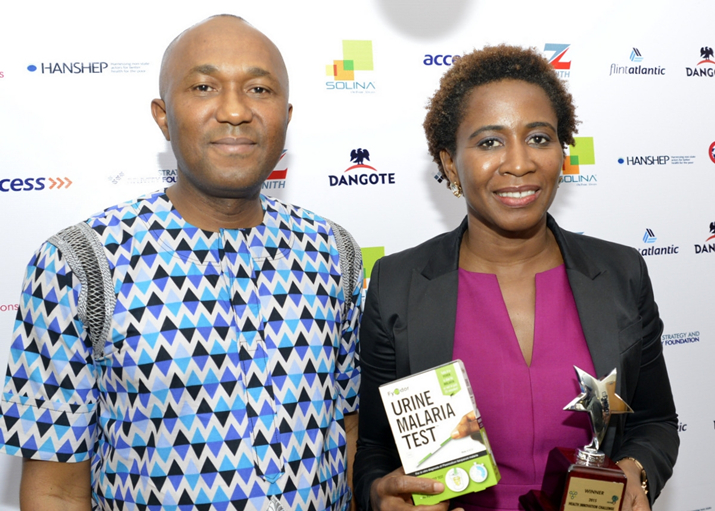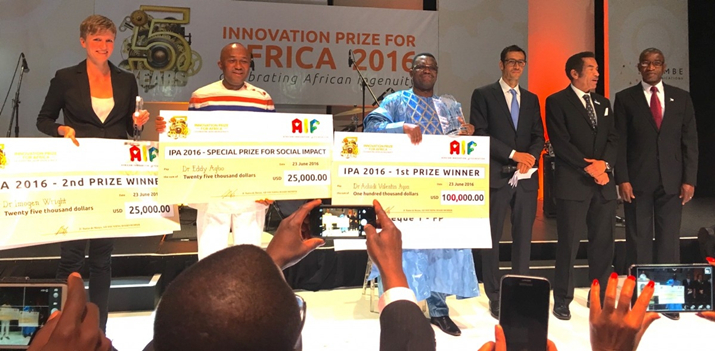|
||||||||||
| Home Nation World Business Opinion Lifestyle ChinAfrica Multimedia Columnists Documents Special Reports |
|
||||||||||
| Home Nation World Business Opinion Lifestyle ChinAfrica Multimedia Columnists Documents Special Reports |
| Africa |
| The Divine Gift |
| Nigeria-born’s do-it-yourself test kit makes malaria diagnosis simpler |
| By Sudeshna Sarkar | VOL. 8 October 2016 ·2016-10-13 |

Eddy Agbo and Victoria Enwemadu of Fyodor Biotechnologies display the Urine Malaria Test kit
Eddy Agbo had a close companion while growing up in Mbu, a small village in southeast Nigeria, in the 1960s. It was malaria.
"I lived through malaria for a large chunk of my life," the 49-year-old winner of a recent award for innovation with a social impact, said, sitting in his office in Baltimore, the United States. "The medicine provider in my village, like in any typical village in Nigeria, was the village chemist, who had no training in pharmacy, and almost every fever was first treated for malaria. You were dosed with chloroquine or quinine and if that didn’t cure the fever in a week, then you were treated for the other common cause of fever, typhoid."
In the 1980s, global malaria deaths stood at an estimated 995,000, according to a research funded by the Bill & Melinda Gates Foundation. Malarial deaths in Africa accounted for nearly half of this with 493,000 recorded cases. By 2004, considered the peak for malarial deaths, the number in Sub-Saharan Africa leapt to 1.6 million that year, when the global toll was 1.8 million.
Driven by tragedy
While he survived, Agbo saw children of his age die around him and those images stayed in his mind. Three decades later, when he saw things were still almost the same, he felt since he had the knowledge to address the situation, he should work to bring about change.
By that time, there had been plenty of changes in his life. The village boy had received a Doctor’s degree of Veterinary Medicine from the University of Ibadan, Nigeria, and was working for the Federal Government of Nigeria. Then he was sent to the Netherlands on a year-long training program and was drawn to the growing buzz about biotechnology. He wanted to study this new science that seemed to hold so much potential, applied for a scholarship, and came back with a Ph.D in molecular genetics from the Utrecht University, the Netherlands.
The degree helped him get a job at the Johns Hopkins University in Maryland, the United States, and after a stint there, by which time he had acquired permanent U.S. residency, he decided to start his own company, Fyodor Biotechnologies. "Fyodor means divine gift in Russian," he explained. "I kind of see it as an opportunity to leave something on the planet that will make a positive change."

Eddy Agbo (second left) receives the Innovation Prize for Africa 2016 in Gaborone, Botswana, in June
However, when he founded Fyodor in Maryland, many thought it was a crazy thing to do. "In 2008, the world economy was at the bottom and it was tough to start out. But we saw an opportunity." The opportunity was Africa, where malaria was still rampant. So his plan was to devise a simple test kit, like a do-it-yourself pregnancy kit, that would enable people to find out if they had malaria fast and without any fuss.
"We used the model of Nigeria-U.S. operations with entities in both countries since we could use the logistics in the United States to find a product that could be marketed in Africa," he said. Grants from the U.S. Federal Government and the Maryland Government as well as funding by angel investors helped raise the money to start Fyodor, recruit his team and research and experiment for seven years. Finally, the Urine Malaria Test (UMT) kit became a reality in 2015.
Lab test in a cup
The UMT comes with a cup and a dipstick. The user fills the cup with a few drops of urine, dips the stick in it and waits for 25 minutes. Then if two red lines appear on the stick, it means the user is malaria-positive. How does this work? Agbo explains in lay terms: "When people run a fever, they tend to shed a lot of proteins in their urine. Fever is a sign of malaria. If the fever is caused by the malarial parasite, the body would also excrete the parasite protein through urine. The dipstick fishes out these proteins, resulting in two red lines across the strip if positive for malaria. If we are not running a fever, we usually do not have proteins in our urine." What is the significance of the invention? First, it stops random treatment for malaria without any confirmatory diagnostic test, according to Agbo. Prolonged use of quinine and chloroquine has side effects and they were banned by some countries while the World Health Organization recommended discontinuing their use. They have been banned by the Nigerian Government.
Second, Agbo says the UMT is simpler. A lot of companies are into malaria diagnostic kit production. All such kits made before the UMT were based on blood. "It was not simple and was risky," he noted. "Also you needed someone to draw the blood and conduct tests. That is why many governments, especially in Africa, don’t allow non-healthcare facilities to use such kits. But the UMT brings a new dimension. In Nigeria, it is marketed by Fyodor’s partner Geneith Pharmaceutical and is available in pharmacies and clinics and can even be bought online."
A family pack with five kits costs $12. It was launched in Nigeria last November after a clinical trial in the country under Professor Wellington Oyibo of the University of Lagos’ College of Medicine. There were over 2,000 volunteers who participated in the trial besides clinicians and scientists from the Johns Hopkins University, Duke University in the United States and experts from Nigerian Federal Ministry of Health. Eventually, the ministerial committee set up by the Federal Ministry of Health recommended the use of UMT in the country. Subsequently, the first batch of UMT kits was shipped to Nigeria in February.
Four months later, it has fetched Agbo the Innovation Prize for Africa from the Swiss-based African Innovation Foundation. Out of 985 applications, the UMT kit was chosen for the Special Prize for Social Impact.
Agbo is quietly jubilant. "It was a great moment for us," he said. "We feel recognized by the global community. It was a validation of the import of the UMT technology and the work Fyodor has done to bring it to market."
He calls it a major time point in the diagnosis of malaria: "The first one was in 1880 when a Frenchman [army surgeon Charles Laveran], first identified the malaria parasite by examining a patient’s blood under the microscope [and received the 1907 Nobel Prize for the discovery]. The second occurred almost 100 years later in 1976 when American company Becton Dickinson became the first to introduce a rapid blood-based diagnostic test for malaria. The third major milestone was the UMT in 2015."
Serving Nigeria from abroad
If Africa means so much to him, why did he accept American citizenship in 2013? "I am a Nigerian by birth and a Nigerian first," he replied. "I spend 50 percent of my time in the United States and the rest in Nigeria. The dual citizenship allows me to do more for Nigeria, the United States and the world. The United States has supported the work extensively and the dual citizenship allows me to bridge both regions."
The UMT has generated responses from medical kit manufacturers in Africa, South America, India and China. "A lot of Chinese companies are making malaria medicines based on artemisinin combination therapy. They will be a good partner for us as the kit could be a companion to be used with the medicine." Though China is not a malaria-endemic country, the UMT could be useful for the large number of Chinese who travel to malaria-endemic countries for work, business or tourism, he added.
What is next on the anvil? A similar kit that will diagnose other fevers like dengue and typhoid.
| About Us | Contact Us | Advertise with Us | Subscribe |
| Copyright Beijing Review All rights reserved 京ICP备08005356号-5 京公网安备110102005860号 |